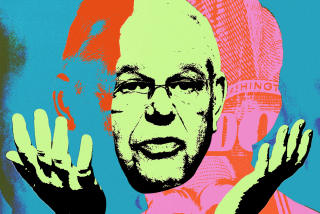Philippine Probers Stir Controversy : For Sale: Marcos’ Yachts, Cars and Coconut Palace
- Share via
MANILA — On the 10th floor of an office building in suburban Manila, Victor Ziga has a sale going on, offering what might be called the spoils of revolution. Among his wares:
--Forty-one Lear jets and assorted other luxury aircraft, including a dozen helicopters.
--A 246-foot yacht, complete with grand pianos, a video room, a 40-line telephone system, a helicopter landing pad and two 20-millimeter anti-aircraft guns.
--A fleet of Mercedes-Benz automobiles, including a $75,000 limousine used only by presidents, prime ministers and kings.
--A multimillion-dollar palace built entirely of coconuts for Pope John Paul II, which has been visited by such notables as Brooke Shields and Cristina Ford.
These are the leftovers of the government of deposed President Ferdinand E. Marcos and his family. Everything is on the auction block, and if Ziga, the minister of general services, gets his total asking price of about $25 million, the public schoolteachers just might get a raise this year. President Corazon Aquino has said so.
But it is in a group of offices four floors down from Ziga’s ministry that the Aquino government has concentrated its strongest hopes for converting the wealth and wastefulness of Marcos’ 20 years in power into a solution for the Philippines’ economic crisis.
These are the offices of the Presidential Commission on Good Government. For the last four months, the commission’s investigators and attorneys have been poring over the books and records of the Philippines’ largest and richest corporations. They are looking for links between the corporations’ owners and the $10 billion they believe was diverted from the national treasury by Marcos, his family and his associates.
While Ziga’s auction--a process of open bidding likely to last for weeks--is the first substantial attempt to turn past government waste into capital for economic recovery, his task is considerably easier than that of the Commission on Good Government.
The planes and yachts and palaces being offered for sale are already owned by the government. They have been deemed wasteful and unnecessary by a management study team trying to streamline the bloated bureaucracy Marcos left behind. Even if Ziga gets his asking price for every item, the proceeds will amount to less than 1% of the country’s $26-billion foreign debt.
“It is not going to be enough,” Ziga said. “The idea of the president (Aquino) is to show not only the Filipinos but the world that we are trying to raise these funds and get rid of all these wasteful luxury items from the Marcos years--to live and lead by example. It will be up to the Good Government Commission to go after most of the money the Marcoses stole.”
Most Active Agency
In the four months since Aquino succeeded Marcos, the Good Government Commission has easily become the most active--and controversial--department in the new administration.
Through seizures and sequestrations of bank accounts, corporate shares and land titles held by the Marcoses and their associates in the Philippines, the commission has recovered more than $70 million in cash. It has taken control of 218 corporations representing $1 billion more. And it has seized an additional $300 million in prime real estate throughout the Philippines.
The four-member commission also has taken legal action to acquire control of hundreds of millions of dollars in real estate owned by Marcos and his associates in the United States and several billion dollars in cash and precious metals the Aquino government suspects Marcos hid in Swiss bank accounts over the years.
Chiefly on the basis of this legal action, Ramon Diaz, a member of the commission, gave an optimistic assessment of the eventual success of his commission.
“If our estimates are borne out,” he said in an interview, “we might be able to get back as much as half the entire national debt--roughly $13 billion.”
He said the process could be completed in two to three years, but few Filipino economists and legal experts agree with that prediction.
Marcos and his associates have hired an international battery of lawyers to fight the commission, especially in Switzerland. Already many of the cases have become bogged down in legal complexities, and lawyers say the delays could last for years.
Rafael Recto, Marcos’ attorney in Manila, has said he intends to fight the commission until every appeal is exhausted--especially the government’s case to recover what officials believe to be Marcos’ Swiss bank accounts.
Swiss May Gain
“Do you think the Swiss are stupid?” Recto said recently. “You will collapse all the Swiss banks if you pull out $2 billion or $3 billion. Even if Mr. Marcos owns that, the Swiss will not give it to Mr. Marcos, because Mr. Marcos maintains he does not own it. And also they will not give it to the Philippine government.”
Other critics of the commission, among them former Labor Minister Blas Ople and several other Marcos associates, say Marcos was a shrewd attorney who hid his ownership in many corporations behind intricate, layered veils of subsidiaries, some of them based in the Bahamas and other countries where corporate ownership is, by law, secret.
Even Diaz concedes that the fortune Marcos amassed “was not the work of a few cronies alone but hundreds of accomplices, professionals, lawyers and accountants.”
Further complicating the commission’s work is the growing impression that the commission has assumed too much power in its zeal to acquire the Marcos assets and, as Diaz phrases it, “to conserve those assets.”
Already, the commission has given itself seats on the boards of directors of two of the country’s largest corporations--the San Miguel Corp., a beer and food conglomerate, and the huge Philippine Long Distance Telephone Co.--after seizing controlling interest in the two companies.
Several of San Miguel’s directors have sued the commission, alleging that the sequestration of the corporation violated due process. In one court petition, San Miguel attorney Raul S. Roco called the commission’s decision “a despotic abuse of discretion and an arrogant exercise of a power that does not belong to the commission.”
Dakila F. Castro, lawyer for another sequestered company, was more blunt in his criticism. In a legal brief, Castro called the commission “a five-headed and multi-tentacled, man-made monster.”
Dozens of such legal challenges to the commission’s power have been filed by the many seized corporations, among them cases involving the national telephone company and the once private duty-free shops that a Marcos associate had been given exclusive rights to operate. With the nation’s court system already in disarray after Aquino’s mass replacement of judges, those cases are likely to delay the recovery of assets by months or even years.
Adding to the controversy is the fact that the commission’s holdings are now so vast that it has had to spend funds of its own to hire outside management and consultants. Many Filipinos are beginning to wonder whether the commission plans ever to liquidate these assets in order to help retire the national debt, or whether it intends simply to turn them over to the government in a process aimed at increasing public ownership.
Policy Questioned
In a public statement, former Labor Minister Ople recently asked, “Is the Aquino administration really for private enterprise? The actions of the Good Government Commission would certainly give one pause to wonder.”
Publicly, Aquino has said often that she favors private ownership and capitalism over socialism. Her only goal in the economic reorganization of the nation, she has said, is “to dismantle both the economic and the political oligarchy” Marcos created and return to a system of open and competitive free enterprise.
But even members of Aquino’s Cabinet have begun to question the motives and the enormous power of the Good Government Commission, which is headed by former Sen. Jovito R. Salonga. The most powerful of these critics has gone a step further, and suggested that the commission has been infiltrated by Communists.
Defense Minister Juan Ponce Enrile said the other day in a statement that the Communist Party of the Philippines has “successfully infiltrated various national government offices in an effort to destabilize the administration of President Aquino.”
He mentioned specifically the Good Government Commission, and he said its attempts to secure memberships on the boards of powerful private corporations are a first step toward taking over not only the country’s political institutions but its financial institutions as well.
The Good Government Commission denied the charge, as did the National Democratic Front, the Communist Party’s political front group. But Enrile’s charges hint at a deeper problem developing behind the scenes--the widely held belief that the commission eventually may target Enrile himself for investigation.
Enrile served Marcos for more than two decades before he helped organize the coup that drove the former president from power in February. For more than 10 years, Enrile was Marcos’ defense minister, and he served on the boards of several private and public corporations linked to Marcos associates.
Asked whether Enrile was a target of the Good Government Commission’s investigation into hidden wealth, commission member Diaz said, “We have not really come up with any hard evidence yet, but we are pursuing several leads involving Minister Enrile.”
A confrontation between the commission and the defense minister, who still commands respect and authority among the 200,000 men of the Philippine Armed Forces, could seriously affect relations between the government and the military.
Already there have been rumors in military circles of another coup, possibly one that would put the government in the hands of a largely military junta. The Good Government Commission is often mentioned as a potential trigger for such a move by military forces loyal to Enrile.
Enrile, who was born poor but amassed a modest fortune as an attorney after graduating from Harvard University, has denied many times that he used his position in government to enrich himself.
Asked about Diaz’s comment that Enrile is among the possible targets of the hidden-wealth investigation, Enrile said: “Sure, they can investigate me. By all means. I welcome their efforts to examine our books and records, all of them.”
Asked whether the Good Government Commission can succeed in its primary goal of substantially reducing the nation’s debt, Enrile said: “I don’t know. I just don’t know, and I’m not sure anyone does.”
Ziga, the minister of general services, said he doubts it. “I just don’t think it’s going to be enough,” he said. “The numbers just don’t seem to be there. But we have to start somewhere. We must show we are trying.”
More to Read
Sign up for Essential California
The most important California stories and recommendations in your inbox every morning.
You may occasionally receive promotional content from the Los Angeles Times.










